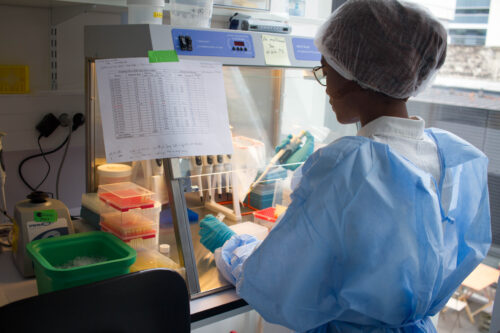July 2023

Dr. Mohamed Ali, tell us a bit about your background.
My name is Souand Mohamed Ali, and I am currently a postdoctoral fellow at Institut Pasteur de Paris in France. I obtained my PhD in infectious diseases in Marseille, France, where my research focused on studying the evolution of arboviruses, specifically the chikungunya virus. During my doctoral studies, I acquired extensive knowledge in various molecular biology techniques, molecular cloning, and serology.
Following my PhD, I had the opportunity to work in Shanghai, where I applied my skills towards the development of human neutralizing monoclonal antibodies against the Wesselsbron virus, an understudied arbovirus with emerging urban potential. Unfortunately, my plans to continue working in Shanghai were disrupted by the Covid-19 pandemic. Following a brief visit to France during the Chinese New Year vacation, I encountered travel restrictions that prevented my return to Shanghai as initially planned.
To be useful in the face of the health crisis, I decided to rejoin my former lab and actively participate in the Covid task force. In this role, I was involved in the development and implementation of diagnostic techniques for SARS-CoV-2. After dedicating a year and a half to working on Covid-19, I was recruited by my current lab in Paris.
At my current lab, my research primarily revolves around the identification of potential zoonotic viruses among metaviromes of arthropod vectors from Cambodia and Cameroon. I employ high-throughput sequencing and serological techniques to conduct this investigation, aiming to gain new insights into the transmission dynamics of viruses with zoonotic potential.
What has working on the PICREID project brought you in terms of professional development opportunities?
Being a part of the PICREID project offers me a unique opportunity to collaborate with diverse international teams, enhancing my skills in management and communication. Moreover, it satisfies my deep curiosity and passion for studying the intricate interactions between viruses and their hosts, with a specific focus on arboviruses. Engaging in this project allows me to continuously learn and broaden my knowledge in the field while also enabling me to establish valuable connections within the professional network.
What are some of the challenges post-docs in your field are facing?
For me, the significant challenge lies in the inherent job insecurity associated with postdoctoral positions. In France, there are specific time limits and regulations for postdocs that restrict the possibility of working on a single project for an extended period. This constant need to transition from one project to another can create uncertainties and disrupt the continuity of research, making it difficult to establish long-term research goals and collaborations.
The CREID network has a Pilot Program for early-career researchers. If you were to submit your own research project, what might that look like?

If I were to submit a project proposal, it will be a project focused on the Comoros, my native country which is heavily impacted by arboviral diseases. Unlike neighboring countries like Madagascar or Reunion Island, Comoros lacks appropriate infrastructure for disease diagnosis and comprehensive research in this field. There has been limited external study conducted on these diseases as well. Consequently, there is immense potential to explore both entomology and virology domains within this context.
My initial target would be a high-risk region characterized by a substantial presence of disease vectors and a population exhibiting febrile symptoms. The project would entail the following objectives: (1) Utilizing molecular methods to detect arboviruses present in the vectors. (2) Conducting seroprevalence studies to gain precise insights into the proportion of individuals affected by arboviruses.
The goal is to establish after a sustainable surveillance network for arboviral diseases, enabling efficient response to epidemics and proactive identification of emerging diseases. By doing so, we can effectively address public health concerns and anticipate the arrival of new reemerging diseases in the long term.


